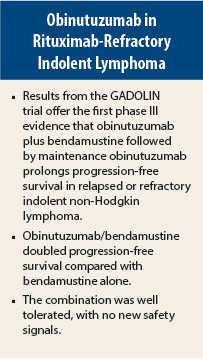The addition of obinutuzumab (Gazyva) to standard bendamustine (Treanda) chemotherapy followed by obinutuzumab maintenance therapy delays the progression of indolent non-Hodgkin lymphoma (NHL), almost doubling progression-free survival in rituximab (Rituxan)-refractory patients, according to the results of the phase III GADOLIN trial presented at the 2015 ASCO Annual Meeting.1
Median progression-free survival was 29.2 months with obinutuzumab/bendamustine plus maintenance obinutuzumab vs 14 months with bendamustine monotherapy and no maintenance. These results were so robust that the trial was halted early.
“Indolent NHL is incurable with standard therapy. Rituximab improves overall survival and progression-free survival, but some patients do not respond to rituximab. Others become resistant to rituximab, and these patients have a poor outcome and few treatment options,” explained lead author Laurie Sehn, MD, of the British Columbia Cancer Agency and the University of British Columbia, Vancouver, Canada.
“This study is a remarkable first demonstration of the benefit of a novel antibody for patients who are rituximab-refractory. Results are statistically significant and clinically meaningful, with no new safety signals. Based on these results, bendamustine plus obinutuzumab followed by obinutuzumab maintenance is a novel and effective treatment option for patients with indolent NHL refractory to rituximab,” she stated.
Study Details
GADOLIN randomized 413 patients to receive obinutuzumab/bendamustine followed by obinutuzumab maintenance vs bendamustine alone with no maintenance. In the combination arm, bendamustine was dosed at 90 mg/m2, a dose used commonly in combination with other drugs. In the monotherapy arm, the dose was 120 mg/m2 for up to six cycles.
The clinical characteristics were comparable in both arms of the trial. The median age was 63 years, with a median of two prior lines of therapy. More than 90% of patients in each arm were refractory to their previous therapy. Between 76% and 81% were double-refractory to both rituximab and an akylating agent.
Reduced Disease Progression
At a planned interim analysis, the study met its primary endpoint of progression-free survival. Median progression-free survival, as assessed by an independent radiology facility, was 14.9 months for bendamustine vs not yet reached in the combination arm, representing a 45% reduction in the rate of disease progression (P = .0001). Investigator-assessed progression-free survival was similar. Progression-free survival favored the obinutuzumab combination in the majority of subgroups analyzed.
Response rates were similar in the two arms. The best overall response rate to 12 months was 78.7% for the combination arm vs 76% for the bendamustine arm. Median overall survival is not yet reached in either arm, but the numbers trend toward favoring the combination arm. However, longer follow-up is needed.
Adverse Events
No difference was observed between the two treatment arms in the rate of adverse events, grade 3 or higher adverse events, deaths, and withdrawal from therapy. The most common hematologic toxicities of any grades in both arms were neutropenia (35% for the combination and 29% for bendamustine alone) and thrombocytopenia (15% vs 24%).
The most common nonhematologic toxicities of any grades were infusion-related reactions (69% vs 63%), nausea (54% vs 61%), fatigue (39% vs 33%), and diarrhea (27% vs 30%). The rates of grade 3/4 neutropenia were 33% with the combination vs 26.3% with bendamustine; grade 3/4 thrombocytopenia occurred in 10.8% vs 16.2%, respectively.
The most common grade 3/4 nonhematologic toxicity was infusion-related reaction, occurring in 10.8% of the combination arm vs 5.6% with bendamustine alone. Serious adverse events were febrile neutropenia in the combination arm (4.1%) and pneumonia in the bendamustine arm (5.1%).
“I sometimes think of obinutuzumab as a super-rituximab. These robust results for this novel agent in a rituximab-refractory population are remarkable. This study may open up treatment options for this difficult-to-treat population, and maybe it will even allow these patients with incurable lymphoma to live longer. Obinutuzumab/bendamustine is not yet standard of care but has the potential to be standard of care for those patients who haven’t received bendamustine in the front-line setting,” said Merry-Jennifer Markham, MD, ASCO expert, of the University of Florida, Gainesville. ■
Disclosure: Dr. Sehn has received honoraria from and served as a consultant or advisor to Amgen, Celgene, Gilead Sciences, Janssen, Lundbeck, Pfizer, and Roche/Genentech. Her institution also received research funding from Roche Pharma AG. Dr. Markham reported no potential conflicts of interest.
Reference
1. Sehn LH, Chua NS, Mayer J, et al: GADOLIN: Primary results. 2015 ASCO Annual Meeting. Abstract LBA8502. Presented on June 1, 2015.




